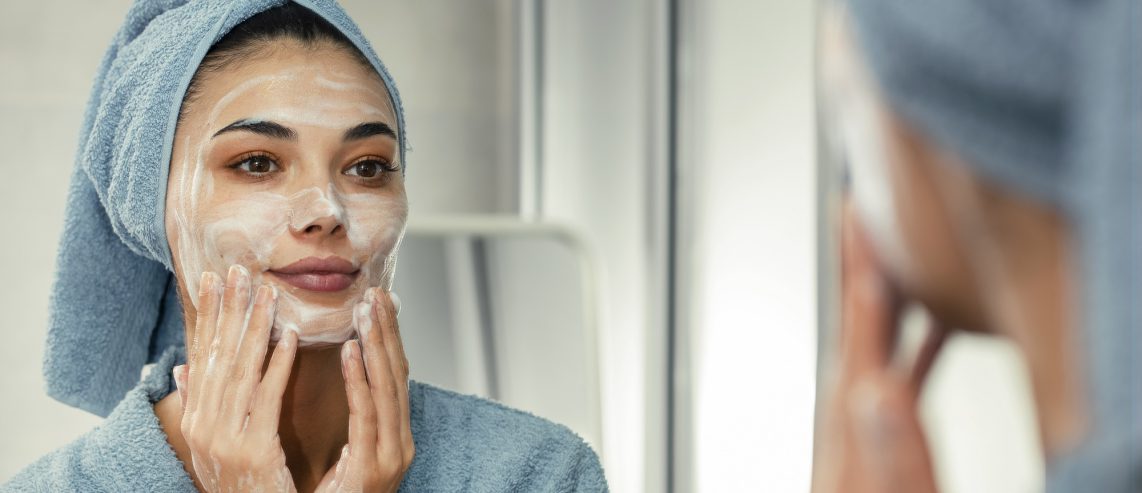Skin is our first line of defense against injury, illness, allergens, and other hazards. It also provides a protective barrier against the sun’s damaging ultraviolet (UV) radiation.
Caring for your skin can improve your self-esteem and may slow signs of aging. But a dermatologist-backed skin care routine can also protect you from skin diseases and infections.
Signs of Unhealthy Skin
Some skin-related issues that may require additional or special treatment include:
- Blisters.
- Bug bites.
- Contact dermatitis.
- Lesions.
- Poison ivy.
- Rashes.
- Skin cancer.
- Skin disorders, such as acne or eczema.
- Skin infections, such as cellulitis.
- Wounds, burns, sunburns, and scars.
You should also talk to a doctor if you have:
- Abnormal or new skin moles or moles that are large, painful, itchy, or irregular in shape.
- Blistering or severe burns.
- New nodules, lumps, skin discoloration, or other skin changes.
- Other unexplained skin rashes or conditions.
- Signs of an allergic reaction, such as itching, redness, hives, skin rashes, or heat.
- Signs of infection, such as pus, swelling, or pain.
- Signs of inflammation, such as redness, heat, swelling, pain, or fever.
Never Miss a Beat!
Download our guide to happier, healthier skin.
Thank you for subscribing!
You can now select the specific newsletters you'd like to receive.
You are already subscribed.
Subscribe to more newsletters in our email preference center.
Sorry, an error occurred. Please try again later.
Get Healthy Tips Sent to Your Phone!
Risk Factors for Skin Diseases
Some genetic factors may make you more susceptible to skin diseases like skin cancer. People who are at greater risk of skin cancer include those with:
- Blond or red hair.
- Blue or green eyes.
- Certain types of or a large number of moles.
- Exposure to UV rays or a history of sunburn.
- Fair skin that burns, freckles, or reddens easily.
- A family history of skin cancer, especially melanoma.
- A history of radiation therapy (often for cancer treatment).
- A history of tanning bed use.
- A personal history of skin cancer.
Reducing your exposure to UV rays can also keep your skin healthy and decrease your chances of getting skin cancer, even with these risk factors.
What Your Skin Needs to Stay Healthy
It’s easy to feel drawn to — and quickly burned out by — elaborate skin care routines with a dozen steps and countless products.
Though certain skin types may need specialized treatment, healthy skin often starts with:
- Cleanser: Use a mild facial cleanser with lukewarm water twice a day.
- Exercise: There’s some evidence that breaking a sweat can help fight acne; just make sure to wash your face afterward.
- A healthy diet: Eating a diet rich in lean protein and vitamins can help keep your skin looking and feeling healthy.
- Moisturizer: A simple, fragrance-free moisturizer is often all you need to keep your skin hydrated.
- Sun protection: Wear sunscreen with a sun protection factor (SPF) of 30 or higher every day.
Do I Need a Skin Care Routine?
Not everyone needs a complicated skin care routine. But some skin types may require more steps and products than others.
Many who simply wash, moisturize, and protect their skin from the sun may not even consider this a skin care “routine.” Still, it absolutely counts.
In many cases, less is more.
A cluttered routine can create more problems. Too many products — especially anti-aging products — can irritate your skin, experts say. Exfoliating too often can dry out your skin and cause breakouts.
Though routines may vary based on factors like skin type, age, and skin conditions, dermatologists suggest focusing on using a gentle cleanser. They also suggest sunscreen and moisturizer when establishing your morning and evening routines.
Someone with dry or sensitive skin may require additional moisturizing or sun protection. Someone with acne-prone skin may use a medicated cleanser. Those with more mature skin may choose to add a retinoid cream to their routine.
Tips for Healthy Skin
Other tips for maintaining healthy skin include:
- Avoid touching your face.
- Don’t smoke.
- Eat well and stay hydrated.
- Exercise.
- Get enough sleep and manage stress.
- Know your skin cancer risk.
- Limit alcohol consumption.
- Moisturize.
- Simplify your routine.
- Use gentle cleansers.
- Wear sunscreen.
Tips for certain skin types
- Dry: Those with dry skin should choose gentle, fragrance-free cleansers and wash just enough to remove dirt and oil. They may want to avoid lathering the skin and find they need a thicker moisturizer. In general, those with dry skin should avoid products that contain alcohol, retinoids, and certain other ingredients. People with dry skin should avoid over-scrubbing or exfoliating, which may irritate the skin or worsen dryness.
- Oily: Those with oily skin should wash their face at least twice a day with a mild, foaming face wash and avoid over-scrubbing. People with this skin type may want to avoid heavy moisturizers. They can instead opt for lighter, oil-free products that don’t clog pores.
- Sensitive: Those with sensitive skin should choose fragrance-free cleansers and moisturizers designed for their skin type. Those with rosacea, eczema, or skin allergies likely have sensitive skin. As a result, certain products may cause inflammation, rashes, swelling, itchiness, or breakouts. People with sensitive skin should avoid over-exfoliating.
About Dermatology
The UPMC Department of Dermatology diagnoses, treats, and manages numerous hair, skin, and nail conditions and diseases. We care for common and uncommon conditions, and our treatments include both surgical and nonsurgical options. We operate several specialty centers for various conditions. The UPMC Cosmetic Surgery and Skin Health Center is a comprehensive dermatologic laser facility, offering a full range of cosmetic services and procedures. With UPMC Hillman Cancer Center, we offer a Skin Cancer Program that provides complete care from screenings, diagnosis, treatment, and beyond. Find a dermatology provider near you.
